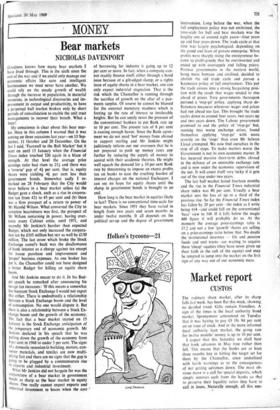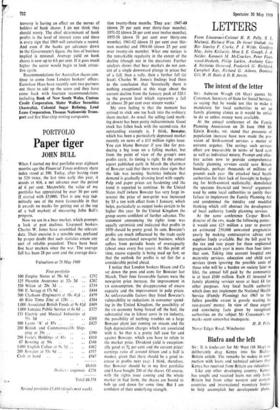Market report
CUSTOS
The ordinary share market, after its sharp falls last week, has been flat this week, showing no decided trend. Gilts remain friendless. A sign of the times is the local authority bond market. Spennymoor announced on Tuesday that it was having to pay £9 18s 9d per cent on an issue of stock. And in the more informal local authority loan market, the going rate for tuelve months' money is up to 10 per cent.
I expect that this Saturday we shall hear that bank advances in May rose rather than fell. This means that the banks are at least three months late in hitting the target set for them by the Chancellor, since underlined with harsh warnings as to the consequences of not getting advances down. The most ob- vious move is a call for special deposits, which simply removes cash from the banks so that to preserve their liquidity ratios they have to call in loans. Naturally enough, all this con-
troversy is having an effect on the nerves of holders of bank shares. I do not think they should worry. The chief determinant of bank profits is the level of interest rates and there is every sign that 1969 will constitute a record. And even if the banks get advances down to the Government's figure, the loss of business implied is minimal. Average yield on bank shares is now up to 4.6 per cent. If it goes much higher the sector would begin to look attrac- tive again.
Recommendations for Australian shares con- tinue to come from London brokers' offices. Earnshaw Haes have recently sent two partners out there to add up the score and they have come back with fourteen recommendations, including Bank of New South Wales, Custom Credit Corporation, Slater Walker Securities (Australia), Colonial Sugar Refining, Lend Lease Corporation, Thomas Nationwide Trans- port and five blue-chip mining companies.



































 Previous page
Previous page